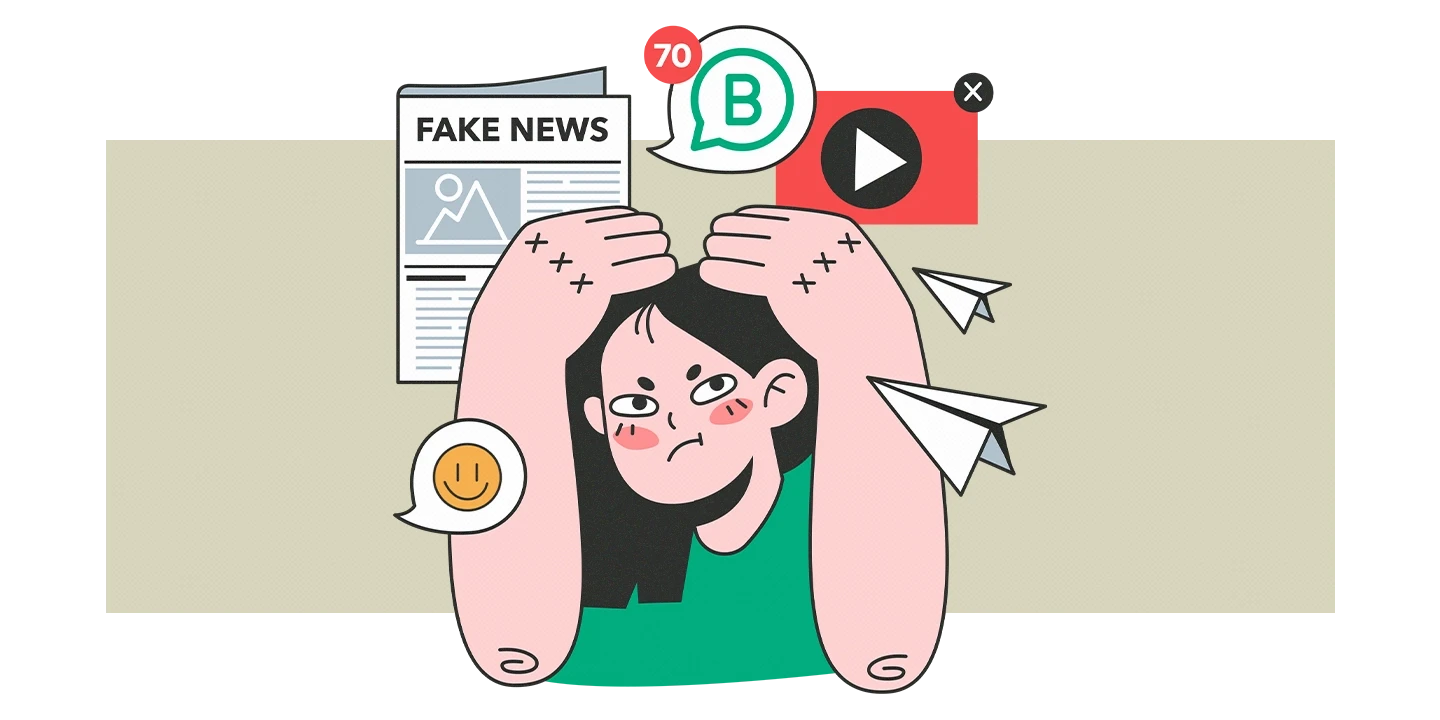
September 12, 2024
WhatsApp groups at work: rules for bosses and employees
Organizations should create app usage policies and provide guidance on best practices in communication.

September 12, 2024
WhatsApp groups at work: rules for bosses and employees
Organizations should create app usage policies and provide guidance on best practices in communication.

September 12, 2024
WhatsApp groups at work: rules for bosses and employees
Organizations should create app usage policies and provide guidance on best practices in communication.
If you have WhatsApp installed on your smartphone or laptop, you are probably part of at least one group on this application.
The tool's ability to gather up to 1024 members in a group and create communities with up to a hundred groups is quite an invitation for people to connect through the platform.
In the corporate environment, more than just a convenience, groups formed by employees, departments, and managers are necessary to provide agility and practicality to operations.

But just because WhatsApp is an informal means of communication doesn’t mean that the use of this tool should be the same in the workplace! There are care guidelines to be followed regarding posture, language, the content that is sent, and the timing of contact to avoid misunderstandings, embarrassments, and infractions to the organization's rules.
See also: Corporate WhatsApp: what it is and how to use it?
How should the company position itself regarding WhatsApp groups?
Did you know that many companies have already been ordered to pay compensation for asking employees, via WhatsApp, to perform tasks outside of working hours?
And that inquiries or requests made by managers to employees in WhatsApp groups can be characterized as moral harassment, leading to legal actions?
Such situations are very common due to the lack of guidance on the app's use in corporations, which causes serious problems, affects the professionals' productivity, and harms interpersonal relationships within teams.
That’s why it's so important for companies to create usage policies for WhatsApp, set limits for communication on the platform, and ensure that these rules are respected at all hierarchical levels.
See also: WhatsApp in companies: how to formalize it?

The practice of raising awareness about etiquette in corporate WhatsApp and groups also helps to avoid abuses, bullying, and harassment. Here are some good practices that companies should adopt with their employees:
Define times for communication between teams and managers. Work-related matters should only be addressed during working hours;
Prohibit requests for tasks from leaders to their subordinates after business hours;
Reinforce the group's purpose and prohibited content in conversations;
Guide users on forms of address and the appropriate language for messages;
Alert employees about the confidentiality of data that may be present in conversations.
Just as leaders have a great responsibility for communication and management of corporate WhatsApp groups, professionals must also fulfill their obligations to ensure good communication with colleagues and supervisors on the platform.
See also: How to engage the team in monitoring corporate WhatsApp?
Etiquette for employees regarding corporate WhatsApp
On WhatsApp, it is often difficult to detect the intention and tone of a text message, which can lead to misunderstandings. Similarly, there are topics that are so delicate to address via the app that a face-to-face conversation would be ideal.
These are basic etiquette tips that we should adopt in interactions with friends, family, neighbors, etc. At work, in addition to these simple rules for good coexistence, there are other details that must be considered to convey reliability and professionalism in individual and group communication. Here they are:
Avoid addressing personal matters, as the purpose of communication is to optimize work;
Do not make judgments about any situation, especially in a group with other people. If this is requested, position yourself to talk personally with the requester;
Do not send stickers, memes, gifs, chain messages, or links of dubious origin;

Do not disseminate fake news or information of a racist, religious, sports, political nature, or that expresses any form of prejudice. Focus on the group's objective;
Do not send personal data of yourself or others in the WhatsApp group. Do not share sensitive company information through this means;
Avoid confrontations and controversies with other members to prevent embarrassment.
An additional care that organizations can adopt in governing communication via corporate WhatsApp is monitoring conversations through the app with the tool Zapper.
See also: Main doubts about corporate WhatsApp monitoring
The manager can input keywords in the tool that indicate suspicious dialogues, and Zapper, upon identifying them, sends a real-time notification for analysis and necessary action.
Zapper is a resource that can aid the compliance and HR departments, as it supervises interactions and captures problematic situations such as misconduct, violations of company policies, use of inappropriate language, abuse of authority, bullying, harassment, and more.
All monitored material is saved in full in cloud, even if a user attempts to delete the conversation or a part of it. Audio, image, video, and text files are also stored indefinitely, with exclusive access for the manager of this communication.

This concern of Zapper regarding the privacy of interactions aligns with the requirements of the General Data Protection Law and aids organizations in information security.
See also: GDPR and WhatsApp: What You Need to Know
With common sense and the use of Zapper's technology, your company will better exercise governance over internal and external communication through corporate WhatsApp.
Click here to schedule a demonstration of the tool.
If you have WhatsApp installed on your smartphone or laptop, you are probably part of at least one group on this application.
The tool's ability to gather up to 1024 members in a group and create communities with up to a hundred groups is quite an invitation for people to connect through the platform.
In the corporate environment, more than just a convenience, groups formed by employees, departments, and managers are necessary to provide agility and practicality to operations.

But just because WhatsApp is an informal means of communication doesn’t mean that the use of this tool should be the same in the workplace! There are care guidelines to be followed regarding posture, language, the content that is sent, and the timing of contact to avoid misunderstandings, embarrassments, and infractions to the organization's rules.
See also: Corporate WhatsApp: what it is and how to use it?
How should the company position itself regarding WhatsApp groups?
Did you know that many companies have already been ordered to pay compensation for asking employees, via WhatsApp, to perform tasks outside of working hours?
And that inquiries or requests made by managers to employees in WhatsApp groups can be characterized as moral harassment, leading to legal actions?
Such situations are very common due to the lack of guidance on the app's use in corporations, which causes serious problems, affects the professionals' productivity, and harms interpersonal relationships within teams.
That’s why it's so important for companies to create usage policies for WhatsApp, set limits for communication on the platform, and ensure that these rules are respected at all hierarchical levels.
See also: WhatsApp in companies: how to formalize it?

The practice of raising awareness about etiquette in corporate WhatsApp and groups also helps to avoid abuses, bullying, and harassment. Here are some good practices that companies should adopt with their employees:
Define times for communication between teams and managers. Work-related matters should only be addressed during working hours;
Prohibit requests for tasks from leaders to their subordinates after business hours;
Reinforce the group's purpose and prohibited content in conversations;
Guide users on forms of address and the appropriate language for messages;
Alert employees about the confidentiality of data that may be present in conversations.
Just as leaders have a great responsibility for communication and management of corporate WhatsApp groups, professionals must also fulfill their obligations to ensure good communication with colleagues and supervisors on the platform.
See also: How to engage the team in monitoring corporate WhatsApp?
Etiquette for employees regarding corporate WhatsApp
On WhatsApp, it is often difficult to detect the intention and tone of a text message, which can lead to misunderstandings. Similarly, there are topics that are so delicate to address via the app that a face-to-face conversation would be ideal.
These are basic etiquette tips that we should adopt in interactions with friends, family, neighbors, etc. At work, in addition to these simple rules for good coexistence, there are other details that must be considered to convey reliability and professionalism in individual and group communication. Here they are:
Avoid addressing personal matters, as the purpose of communication is to optimize work;
Do not make judgments about any situation, especially in a group with other people. If this is requested, position yourself to talk personally with the requester;
Do not send stickers, memes, gifs, chain messages, or links of dubious origin;

Do not disseminate fake news or information of a racist, religious, sports, political nature, or that expresses any form of prejudice. Focus on the group's objective;
Do not send personal data of yourself or others in the WhatsApp group. Do not share sensitive company information through this means;
Avoid confrontations and controversies with other members to prevent embarrassment.
An additional care that organizations can adopt in governing communication via corporate WhatsApp is monitoring conversations through the app with the tool Zapper.
See also: Main doubts about corporate WhatsApp monitoring
The manager can input keywords in the tool that indicate suspicious dialogues, and Zapper, upon identifying them, sends a real-time notification for analysis and necessary action.
Zapper is a resource that can aid the compliance and HR departments, as it supervises interactions and captures problematic situations such as misconduct, violations of company policies, use of inappropriate language, abuse of authority, bullying, harassment, and more.
All monitored material is saved in full in cloud, even if a user attempts to delete the conversation or a part of it. Audio, image, video, and text files are also stored indefinitely, with exclusive access for the manager of this communication.

This concern of Zapper regarding the privacy of interactions aligns with the requirements of the General Data Protection Law and aids organizations in information security.
See also: GDPR and WhatsApp: What You Need to Know
With common sense and the use of Zapper's technology, your company will better exercise governance over internal and external communication through corporate WhatsApp.
Click here to schedule a demonstration of the tool.
If you have WhatsApp installed on your smartphone or laptop, you are probably part of at least one group on this application.
The tool's ability to gather up to 1024 members in a group and create communities with up to a hundred groups is quite an invitation for people to connect through the platform.
In the corporate environment, more than just a convenience, groups formed by employees, departments, and managers are necessary to provide agility and practicality to operations.

But just because WhatsApp is an informal means of communication doesn’t mean that the use of this tool should be the same in the workplace! There are care guidelines to be followed regarding posture, language, the content that is sent, and the timing of contact to avoid misunderstandings, embarrassments, and infractions to the organization's rules.
See also: Corporate WhatsApp: what it is and how to use it?
How should the company position itself regarding WhatsApp groups?
Did you know that many companies have already been ordered to pay compensation for asking employees, via WhatsApp, to perform tasks outside of working hours?
And that inquiries or requests made by managers to employees in WhatsApp groups can be characterized as moral harassment, leading to legal actions?
Such situations are very common due to the lack of guidance on the app's use in corporations, which causes serious problems, affects the professionals' productivity, and harms interpersonal relationships within teams.
That’s why it's so important for companies to create usage policies for WhatsApp, set limits for communication on the platform, and ensure that these rules are respected at all hierarchical levels.
See also: WhatsApp in companies: how to formalize it?

The practice of raising awareness about etiquette in corporate WhatsApp and groups also helps to avoid abuses, bullying, and harassment. Here are some good practices that companies should adopt with their employees:
Define times for communication between teams and managers. Work-related matters should only be addressed during working hours;
Prohibit requests for tasks from leaders to their subordinates after business hours;
Reinforce the group's purpose and prohibited content in conversations;
Guide users on forms of address and the appropriate language for messages;
Alert employees about the confidentiality of data that may be present in conversations.
Just as leaders have a great responsibility for communication and management of corporate WhatsApp groups, professionals must also fulfill their obligations to ensure good communication with colleagues and supervisors on the platform.
See also: How to engage the team in monitoring corporate WhatsApp?
Etiquette for employees regarding corporate WhatsApp
On WhatsApp, it is often difficult to detect the intention and tone of a text message, which can lead to misunderstandings. Similarly, there are topics that are so delicate to address via the app that a face-to-face conversation would be ideal.
These are basic etiquette tips that we should adopt in interactions with friends, family, neighbors, etc. At work, in addition to these simple rules for good coexistence, there are other details that must be considered to convey reliability and professionalism in individual and group communication. Here they are:
Avoid addressing personal matters, as the purpose of communication is to optimize work;
Do not make judgments about any situation, especially in a group with other people. If this is requested, position yourself to talk personally with the requester;
Do not send stickers, memes, gifs, chain messages, or links of dubious origin;

Do not disseminate fake news or information of a racist, religious, sports, political nature, or that expresses any form of prejudice. Focus on the group's objective;
Do not send personal data of yourself or others in the WhatsApp group. Do not share sensitive company information through this means;
Avoid confrontations and controversies with other members to prevent embarrassment.
An additional care that organizations can adopt in governing communication via corporate WhatsApp is monitoring conversations through the app with the tool Zapper.
See also: Main doubts about corporate WhatsApp monitoring
The manager can input keywords in the tool that indicate suspicious dialogues, and Zapper, upon identifying them, sends a real-time notification for analysis and necessary action.
Zapper is a resource that can aid the compliance and HR departments, as it supervises interactions and captures problematic situations such as misconduct, violations of company policies, use of inappropriate language, abuse of authority, bullying, harassment, and more.
All monitored material is saved in full in cloud, even if a user attempts to delete the conversation or a part of it. Audio, image, video, and text files are also stored indefinitely, with exclusive access for the manager of this communication.

This concern of Zapper regarding the privacy of interactions aligns with the requirements of the General Data Protection Law and aids organizations in information security.
See also: GDPR and WhatsApp: What You Need to Know
With common sense and the use of Zapper's technology, your company will better exercise governance over internal and external communication through corporate WhatsApp.
Click here to schedule a demonstration of the tool.
If you have WhatsApp installed on your smartphone or laptop, you are probably part of at least one group on this application.
The tool's ability to gather up to 1024 members in a group and create communities with up to a hundred groups is quite an invitation for people to connect through the platform.
In the corporate environment, more than just a convenience, groups formed by employees, departments, and managers are necessary to provide agility and practicality to operations.

But just because WhatsApp is an informal means of communication doesn’t mean that the use of this tool should be the same in the workplace! There are care guidelines to be followed regarding posture, language, the content that is sent, and the timing of contact to avoid misunderstandings, embarrassments, and infractions to the organization's rules.
See also: Corporate WhatsApp: what it is and how to use it?
How should the company position itself regarding WhatsApp groups?
Did you know that many companies have already been ordered to pay compensation for asking employees, via WhatsApp, to perform tasks outside of working hours?
And that inquiries or requests made by managers to employees in WhatsApp groups can be characterized as moral harassment, leading to legal actions?
Such situations are very common due to the lack of guidance on the app's use in corporations, which causes serious problems, affects the professionals' productivity, and harms interpersonal relationships within teams.
That’s why it's so important for companies to create usage policies for WhatsApp, set limits for communication on the platform, and ensure that these rules are respected at all hierarchical levels.
See also: WhatsApp in companies: how to formalize it?

The practice of raising awareness about etiquette in corporate WhatsApp and groups also helps to avoid abuses, bullying, and harassment. Here are some good practices that companies should adopt with their employees:
Define times for communication between teams and managers. Work-related matters should only be addressed during working hours;
Prohibit requests for tasks from leaders to their subordinates after business hours;
Reinforce the group's purpose and prohibited content in conversations;
Guide users on forms of address and the appropriate language for messages;
Alert employees about the confidentiality of data that may be present in conversations.
Just as leaders have a great responsibility for communication and management of corporate WhatsApp groups, professionals must also fulfill their obligations to ensure good communication with colleagues and supervisors on the platform.
See also: How to engage the team in monitoring corporate WhatsApp?
Etiquette for employees regarding corporate WhatsApp
On WhatsApp, it is often difficult to detect the intention and tone of a text message, which can lead to misunderstandings. Similarly, there are topics that are so delicate to address via the app that a face-to-face conversation would be ideal.
These are basic etiquette tips that we should adopt in interactions with friends, family, neighbors, etc. At work, in addition to these simple rules for good coexistence, there are other details that must be considered to convey reliability and professionalism in individual and group communication. Here they are:
Avoid addressing personal matters, as the purpose of communication is to optimize work;
Do not make judgments about any situation, especially in a group with other people. If this is requested, position yourself to talk personally with the requester;
Do not send stickers, memes, gifs, chain messages, or links of dubious origin;

Do not disseminate fake news or information of a racist, religious, sports, political nature, or that expresses any form of prejudice. Focus on the group's objective;
Do not send personal data of yourself or others in the WhatsApp group. Do not share sensitive company information through this means;
Avoid confrontations and controversies with other members to prevent embarrassment.
An additional care that organizations can adopt in governing communication via corporate WhatsApp is monitoring conversations through the app with the tool Zapper.
See also: Main doubts about corporate WhatsApp monitoring
The manager can input keywords in the tool that indicate suspicious dialogues, and Zapper, upon identifying them, sends a real-time notification for analysis and necessary action.
Zapper is a resource that can aid the compliance and HR departments, as it supervises interactions and captures problematic situations such as misconduct, violations of company policies, use of inappropriate language, abuse of authority, bullying, harassment, and more.
All monitored material is saved in full in cloud, even if a user attempts to delete the conversation or a part of it. Audio, image, video, and text files are also stored indefinitely, with exclusive access for the manager of this communication.

This concern of Zapper regarding the privacy of interactions aligns with the requirements of the General Data Protection Law and aids organizations in information security.
See also: GDPR and WhatsApp: What You Need to Know
With common sense and the use of Zapper's technology, your company will better exercise governance over internal and external communication through corporate WhatsApp.
Click here to schedule a demonstration of the tool.

Claudia Campanhã
Journalist, broadcaster, and postgraduate in social media from FAAP

Claudia Campanhã
Journalist, broadcaster, and postgraduate in social media from FAAP

Claudia Campanhã
Journalist, broadcaster, and postgraduate in social media from FAAP
Share:
Share:
Share:
Share: